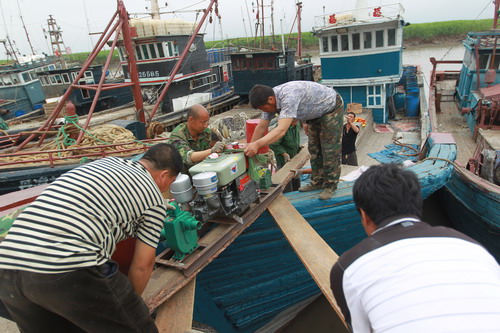|
 |
|
Workers loading a new engine on to a boat used for Sino-DPRK trade on the Yalu River in Dandong, Liaoning province. [Photo / China Daily]
|
Mittal denied the claims. However, according to the Economic Times, he did add: "Our visit to North Korea is to further business interests. We are not looking for a stake in Musan." Meanwhile, companies from the Republic of Korea (ROK), including Pohang Iron and Steel Co Ltd (POSCO) and Korea Resources Corporation, are also stepping up efforts to get a slice of the action in the DPRK.
Currently, there are some 200 mineral deposits in the DPRK, including rare earths, with reserves of 6 billion tons, with a potential value of $6.6 trillion, according to S&F.
Iron ore exploration is still in its infancy in the DPRK. The total mined iron ore was about 50 million tons between 1998 and 2008, or 8.3 percent of the entire reserve.
"As the DPRK opens up, more and more investors from all over the world, including Chinese enterprises, will enter the market. Most of them will be intent on investing in resources projects," said a permanent delegate with the family name Zhou at the Pyongyang office of China Aerospace Beijing Changfeng Co Ltd.
Meanwhile, recent years have seen several Chinese companies, including Sinosteel Corp, China Minerals Corp and Shougang Tonggang Group, enter the iron ore market in the DPRK.
Having entered the DPRK in 2006, through cooperation with a local steel factory, the Shougang Tonggang Group now imports iron ore worth 14 million yuan ($2.2 million) from the country annually.
China imported 1.81 million tons of iron ore from the DPRK in 2009, a slight decline compared with a year earlier.
However, S&F predicts that by 2015, iron ore exports from the DPRK to China will reach at least 4.2 million tons, double the figure this year.
Currently, between 25 and 35 percent of the DPRK's total explored iron ore deposits are exported to China each year.
"Chinese enterprises have obvious advantages when investing in the DPRK's mineral industry because we are not only geographically close to the market but also have ample financial support and the advanced technology that the DPRK needs," said a researcher at the Chinese Academy of International Trade and Economic Cooperation who declined to be identified.
While China is planning to increase investment in minerals mining in the DPRK, the latter is striving to learn about high technology from its neighbor.
He Liangliang, a news commentator at Hong Kong-based Phoenix Satellite Television, said that during his visit to China, Kim showed great interest in high technology.
"The DPRK intends to attract some high-tech Chinese enterprises to establish subsidiaries on Hwanggumpyong Island, from which the country will be able to learn how to improve the innovative capabilities of its domestic companies," commented a Chinese government official in Dandong who also declined to be identified.
The undeveloped island, situated adjacent to Dandong, will be developed as a special economic zone.
The unidentified official added that discussions are under way about a specific development plan for the island, including an amusement park, a free-trade area of 20,000 square meters and an import-export processing area.
|